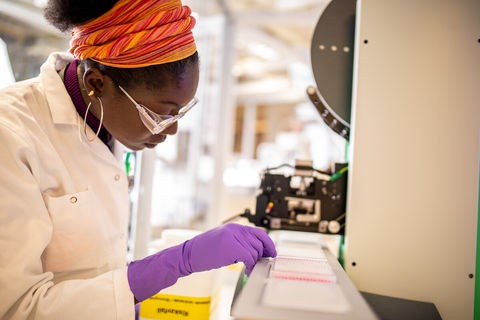
Interim results from the ongoing Phase I and II COV001 trial, led by Oxford University, showed that AstraZeneca’s AZD1222 was tolerated and generated robust immune responses SARS-CoV-2 virus in all evaluated participants.
COV001 is a blinded, multi-center, randomized controlled Phase I or II trial with 1,077 healthy adult participants, aged 18 to 55 years. It assessed a single dose of AZD1222 against a comparator meningococcal conjugate vaccine, MenACWY. Ten participants also received two doses of AZD1222 one month apart.
The results published in The Lancet confirmed a single dose of AZD1222 resulted in a four-fold increase in antibodies to the SARS-CoV-2 virus spike protein in 95% of participants one month after injection. In all participants, a T-cell response was induced, peaking by day 14, and maintained two months after injection.
Neutralizing activity against SARS-CoV-2 (as assessed by the MNA80 assay) was seen in 91% of participants one month after vaccination and in 100% of participants who received a second dose. The levels of neutralizing antibodies seen in participants receiving either one or two doses were similar to those seen in convalescent COVID-19 patients. Strong correlations were observed across neutralization assays.
The early safety responses confirmed that transient local and systemic reactions were common in the AZD1222 group and were comparable to previous trials and other adenoviral vector vaccines.1-4 They included temporary injection site pain and tenderness, mild-to-moderate headache, fatigue, chills, feverishness, malaise and muscle ache. No serious adverse events were reported with AZD1222, and reactions were lessened with the use of prophylactic paracetamol, a pain killer, and occurred less frequently after a second dose.
Professor Andrew Pollard, chief investigator of the Oxford Vaccine Trial at Oxford University and co-author of the trial, said, “The interim Phase I or II data for our coronavirus vaccine shows that the vaccine did not lead to any unexpected reactions and had a similar safety profile to previous vaccines of this type. The immune responses observed following vaccination are in line with what we expect will be associated with protection against the SARS-CoV-2 virus. However, we must continue with our rigorous clinical trial program to confirm this. We saw the strongest immune response in participants who received two doses of the vaccine, indicating that this might be a good strategy for vaccination.”
Mene Pangalos, executive vice president, BioPharmaceuticals R&D, said, “We are encouraged by the Phase I and II interim data showing AZD1222 was capable of generating a rapid antibody and T-cell response against SARS-CoV-2. While there is more work to be done, today’s data increases our confidence that the vaccine will work and allows us to continue our plans to manufacture the vaccine at scale for broad and equitable access.”
Late-stage Phase II or III trials are currently underway in the UK, Brazil and South Africa and are due to start in the US. Trials will determine how well the vaccine will protect from the Covid-19 disease and measure safety and immune responses in different age ranges and at various doses.
In parallel, AstraZeneca continues to fulfill its commitment for broad and equitable access to the vaccine, should late-stage clinical trials prove successful. So far, commitments to supply more than two billion doses of the vaccine have been agreed with the UK, US, Europe’s Inclusive Vaccines Alliance, the Coalition for Epidemic Preparedness, Gavi the Vaccine Alliance and Serum Institute of India.
This announcement is not anticipated to impact the Company’s financial guidance for 2020 as expenses to progress the vaccine are anticipated to be offset by funding by governments and international organizations.
Immune correlates of protection to Covid-19
According to the press release, correlates of protection for a vaccine against Covid-19 have not yet been defined. High levels of neutralizing antibodies have been demonstrated in individuals who have recovered from SARS-CoV-2 infection. In addition, emerging data suggest that a T-cell response could play an essential role in mitigating the disease. Some individuals who have been infected with the virus but remained asymptomatic, have developed a robust T-cell response with an absence of detectable antibodies. Rapid induction of antibodies and T-cells against the SARS-CoV-2 virus may be important in protection against Covid-19.







